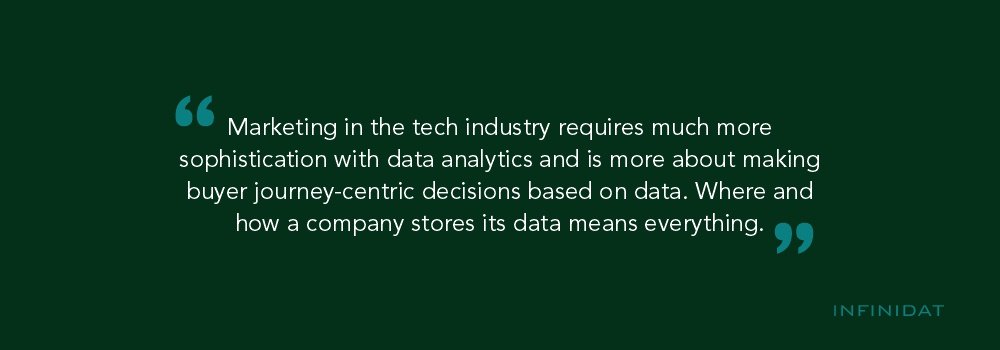In today’s world driven by data and the need for security, data storage and cyber recovery are critically important topics for large enterprise organizations and cloud service providers. The explosive growth in the amount of data that is generated worldwide has propelled the demand for multi-petabyte data storage to expand rapidly, especially to support digital transformation and the proliferation of the Internet of Things (IoT). Concurrently, ever-increasing cyberattacks, such as ransomware, continue to threaten companies, creating a requirement for fast recovery of data. On the front lines of both is Catherine Vlaeminck, Vice President of Global Marketing at Infinidat, an international leader in enterprise-class, multi-petabyte data storage.
With the tech industry shifting focus onto cloud technologies in recent years, Catherine has had to evolve her company’s marketing priorities onto a new wave in storage – building a private cloud for an enterprise organization or service provider. She saw the opportunity to communicate a message about empowering companies with their own private, on-premises, cloud-based storage systems. She leveraged the strength of Infinidat’s storage platform to support this customer-centric story of how an organization can keep control of its data with an on-premises solution but still benefit from cloud technologies.
Now, her challenge is to take the awareness of Infinidat in the enterprise market to the next level with this compelling story. This has required her to better understand the buyers’ journey, develop new, more integrated marketing strategies, super-charge a campaign framework, unleash strategic communications, and enhance the digital marketing initiatives of Infinidat. She is applying her decade of experience in the storage industry as a marketing professional to drive continuous improvement.
Recently, the team at Mirror Review had the chance to interview Catherine, to understand how marketing is catapulting her company forward, why data storage and cyber recovery are so vital in the business world today, and what lessons she has learned that are insightful for future marketing leaders. Here are the snippets:
How has marketing changed in the tech industry? And how are these changes helping you with your goal to elevate market visibility for Infinidat?
More than a decade ago, most people in the tech industry may have said that marketing is about technical product sheets and trade shows. Times have changed, and so has marketing. Now, the focus of marketing needs to be on the buyer’s journey, digital marketing, and storytelling to reach a larger audience. Taking the approach of a comprehensive campaign framework brings together all the pieces of marketing following key themes, and takes ownership of advancing buyers along their journey to a decision.
My team at Infinidat has utilized this approach to increase external awareness about de-risking a business, consolidating IT infrastructure, and the value of flexible consumption and elastic pricing in data storage, among other things. We aim to demystify the complexity of the technologies, simplifying the way we talk about the solutions, so we reach a broader market. We work hard to communicate a message of business value.
As a senior marketing leader with decades of experience, what do you see as your biggest opportunity at Infinidat?
One thing I see as a big opportunity is to work with the company’s new CEO, a storage industry veteran, to start to reinvent Infinidat during this year of its 10th anniversary as a company, as we look ahead in this next decade. It’s a long-term process, but we can make significant strides forward in marketing this year. We are building on the company’s decade-long legacy in enterprise storage.
In marketing, we are digital-first and we’re taking an account-based marketing approach, working closely with our sales teams to target best-fit accounts. Rethinking how a cloud model can be applied, Infinidat helps organizations build their own private cloud. As we focus on why enterprises would want a private cloud as part of a hybrid private/public cloud strategy, this is a great opportunity to tell the Infinidat story relentlessly.
What is your biggest challenge at Infinidat?
The visibility of Infinidat across the enterprise market is a challenge. When CIOs and other IT buyers find out about what Infinidat can offer them, they choose Infinidat more often than not, but not enough CIOs and IT leaders know about Infinidat yet. Although it was founded by a storage industry luminary, Moshe Yanai, our company still needs to increase our brand recognition in the storage market.
When I took over global marketing less than a year ago, I set out to first change the mindset and then elevate the marketing function. 2021 is the first full year of the first stage of our transformation of marketing to rise above the industry noise and strategically use marketing to expand the company’s visibility, especially among Fortune 500 companies.
What do you find most interesting working in the data storage industry?
The digital revolution of the 21st century has made data storage, backup, and recovery as important as ever. The shift to the cloud over the past decade has also caused fundamental shifts in this industry. This new decade is already seeing advancements with machine learning in storage, and I am proud to be at the company that is leading the way.
Disruptive technologies and solutions are creating new opportunities in this industry. I find it exciting to go up against the big incumbents and use marketing channels as a means to connect enterprise customers to the right solutions at the right time. Marketing is not just about pushing out information; it’s all about the customer and how we can help them.
What advice do you have for future marketing leaders who are currently in the early stages of their careers?
Marketing is about establishing a relationship with people who don’t know you yet. Being able to manage complexities and ambiguity is also vital, but it always comes back to people. You are marketing to people, so you need to understand the human element. You need to tap into the emotional level of pain points, challenges, and demands that they are facing to engage effectively and solve their issues.

Also Read: The 10 Revolutionary Women Leaders in Business, 2023





